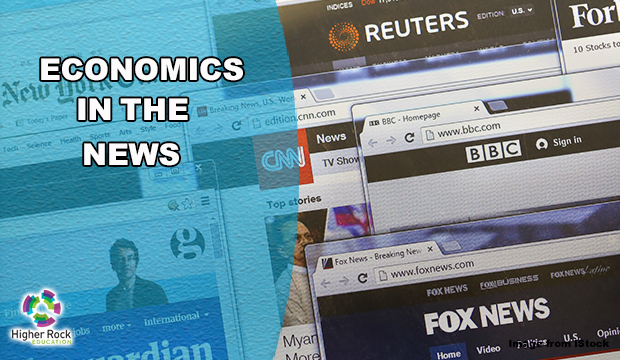
Economics in the News – Sept. 19-25, 2022
Economics impacts our lives every day. Below are some of the top storylines from this past week related to economics.
o The vanishing of starter homes is central to America's national housing crisis. Only about eight percent of new single-family homes sold today are 1,400 square feet or less, compared to 70 percent of homes sold in the 1940s. Prices for houses resembling starter homes have increased and can hardly be bought for under $300,000.
Housing costs have been impacted by land costs, more expensive construction materials and government fees. Communities are also becoming more prescriptive in terms of what they offer residents – from two-car garages, swimming pools, etc. Starter homes help young first-time homebuyers create equity, provide stability and protects the homeowners from increasing rent and inflation. [The New York Times]
o The Organization for Economic Cooperation and Development (OECD) estimates that Russia’s invasion of Ukraine will cost the global economy $2.8 trillion in lost output by the end of next year. The invasion has sparked a dramatic increase in energy prices that has taken a toll on household spending across Europe. On a global scale, the conflict has impacted supply chains, creating shortages of food and other essentials.
Prior to the war, the OECD anticipated 4.5 percent growth in 2022 and 3.2 percent in 2023, but the organization has altered its forecast to 3 percent growth in 2022 and 2.2 percent growth in 2023. The change in forecast means that the war will have cost the world the economic output equal to that of France over those two years. [The Wall Street Journal]
o The Federal Reserve unanimously voted to raise its benchmark federal-funds rate by 0.75 percent. It marked the third 0.75 percentage-point increase in the last three meetings. In addition, the Fed has indicated that an increase between 1 to 1.25 percent is likely over its next two meetings.
The Federal Reserve is far from the only central bank tightening monetary policy, as a response to high inflation. The Group of 20 – representing the 20 largest economies in the world – saw an inflation rate of 9.2 percent in July, doubling the rate from 2021. Signs point to central banks continuing the rate hike. The World Bank reports that July saw the highest number of interest rate increases by central banks around the world since records began in the early 1970s. Other countries that also raised interest rates in the last week, include Indonesia, Norway, the Philippines, South Africa, Sweden, Switzerland, Taiwan and the United Kingdom. [The Wall Street Journal]
o Hurricane Ian is tracking to impact Florida as a major hurricane this week. Meteorologists forecast the storm to intensify in the Gulf of Mexico and hit Cuba as a Category 4 hurricane on Monday. Authorities in Cuba have been evacuating the western part of the island, as the storm threatens the country’s famed tobacco fields.
The hurricane is expected to make landfall in west central Florida on Wednesday. Meteorologists are expecting a storm surge of up to eight feet of ocean water and 10 inches of rain. Florida governor Ron DeSantis has declared a state of emergency, as schools in the Tampa Bay area have been closed to prepare the schools as shelters for evacuees. [Associated Press]
o Retailers are bracing for a difficult holiday season, as Americans continue to deal with high inflation and are spending more on necessities such as food, fuel and housing. Target and Walmart announced an earlier rollout of their annual holiday deals in a bid to attract more cautious and cash-strapped consumers. Analysts expect consumers to shop early in the holiday season because high inflation has made it a necessity for people to hunt for deals and budget over the course of several months.
The two retail giants will roll out their earliest holiday deals during the first week in October. Target’s deal days begin Oct. 6, while Walmart will begin its holidays returns program on Oct. 1. Deloitte estimates sales to increase four to six percent this holiday season, compared to a 15.1 percent increase in sales in 2021. Some analysts expect consumers to shop in-store more this year than during the pandemic. [The Washington Post]